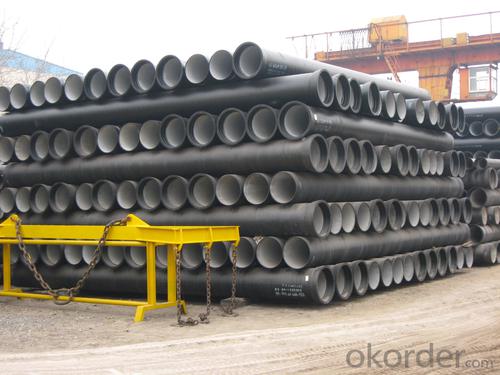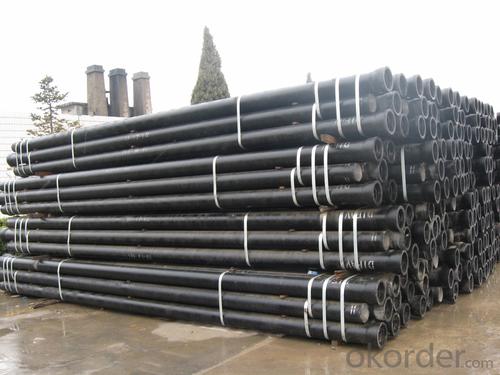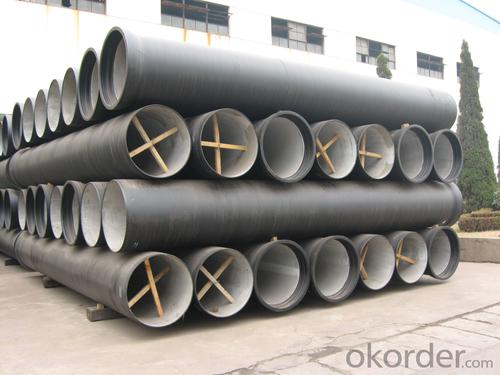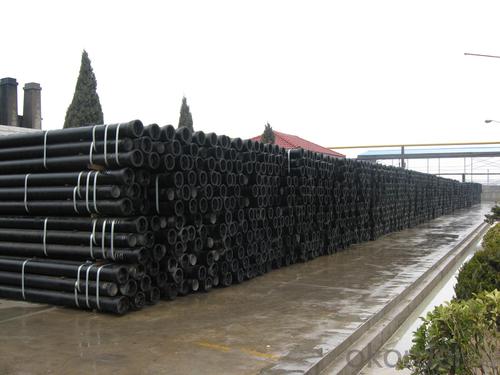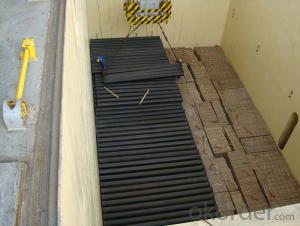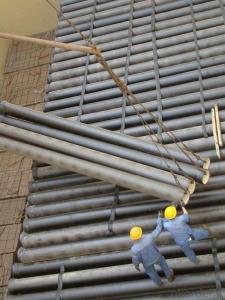DUCTILE IRON PIPE DN900 K8/C/K9
- Loading Port:
- China Main Port
- Payment Terms:
- TT OR LC
- Min Order Qty:
- -
- Supply Capability:
- -
OKorder Service Pledge
OKorder Financial Service
You Might Also Like
Specification:
1) The standard of pipe: ISO2531:1998, K9
2) Effective length: 6m
3) Inner cement line: Portland cement line as per ISO4179
4) Zinc coating: at least 130g/m2 as per ISO8179
5) Bitumen painting: at least 70um as per ISO8179
6) With 100% quantity of NBR ring, or SBR ring, or EPDM ring as per ISO4633
7) DN80mm-800mm
8) High strength, lighter than grey iron, good corrosion resistance, no furring, small flow resistance, easy fixing, long life tome about 100 yeas
9) Produced by Hangzhou chunfeng machine
10) Checked by automatic inspection equipment
11) Composition:
Chemical composition | | | | |||
Chemical composition | Ductile Cast Iron Pipe (%) | Grey iron pipe (%) | Steel pipe (%) | | | |
C | 3.5-4.0 | 3.2-3.8 | 0.1-0.2 | | | |
Si | 1.9-2.6 | 1.4-2.2 | 0.15-0.4 | | | |
Mn | 0.15-0.45 | 0.4-0.6 | 0.3-0.6 | | | |
P | ≤0.06 | ≤0.3 | 0.02-0.03 | | | |
S | ≤0.02 | ≤0.1 | 0.02-0.03 | | | |
Mg | 0.03-0.06 |
|
| | | |
12) Feature:
Mechanical properties | | | | |||
| Ductile Cast Iron Pipe | Grey Iron Pipe | Steel Pipe | | | |
Tensile Strength(Mpa) | ≥420 | 150-260 | ≥400 | | | |
Yield Strength(Mpa) | ≥300 | No Confirmation | No Confirmation | | | |
Bending Strength(Mpa) | ≥590 | 200-360 | ≥400 | | | |
Elongation (%) | ≥10 | Neglected | ≥18 | | | |
Brinell Hardness(HBS) | ≤230 | ≤230 | About 140 | | | |
13) T type mechanical joint
14) Packing: in bulk or container
- Q: Are ductile iron pipes suitable for installation in areas with high seismic activity?
- Areas with high seismic activity are well-suited for the installation of ductile iron pipes. Their ability to withstand external loads and ground movement is a key advantage, making them ideal for seismic zones. In fact, these pipes possess excellent flexibility and high tensile strength, enabling them to endure ground shifting and seismic forces without breaking or fracturing. Additionally, their high resistance to impact and stress decreases their vulnerability to damage during seismic events. Furthermore, the performance of ductile iron pipes in seismic areas has been extensively demonstrated. They have been successfully implemented and utilized in earthquake-prone regions worldwide for numerous years, showcasing their capacity to endure ground movements caused by seismic activity without jeopardizing their structural integrity. Moreover, ductile iron pipes offer the added benefit of being highly durable and long-lasting, which is vital in high seismic areas where infrastructure must withstand frequent ground movements. Their extended lifespan reduces the necessity for frequent maintenance and replacement, resulting in a cost-effective option in the long term. However, it is crucial to note that proper installation techniques and adherence to seismic design guidelines are imperative to ensure optimal performance of ductile iron pipes in high seismic areas. Consulting experienced engineers and adhering to local building codes and regulations is recommended to guarantee correct installation and the ability to withstand the specific seismic conditions of the area. Overall, due to their flexibility, strength, durability, and proven performance, ductile iron pipes are regarded as a suitable choice for installation in areas with high seismic activity.
- Q: Are ductile iron pipes susceptible to external loading or pressure?
- Yes, ductile iron pipes are susceptible to external loading or pressure. Like any other material, ductile iron pipes have a certain amount of strength and tolerance to withstand external forces. However, excessive external loading or pressure can cause deformation or failure of the pipes. It is important to ensure that ductile iron pipes are installed and supported properly to prevent any damage due to external loading. Additionally, the design and engineering of the pipeline system should take into consideration the anticipated external loading and pressure to ensure the pipes can effectively handle the expected conditions. Regular inspections and maintenance are also crucial to identify and address any issues related to external loading or pressure that may arise over time.
- Q: Can ductile iron pipes be used for water supply in remote areas?
- Yes, ductile iron pipes can be used for water supply in remote areas. Ductile iron pipes are known for their strength and durability, making them suitable for various applications, including water supply systems. Their resistance to corrosion and ability to withstand high pressure make them a reliable choice for transporting water even in remote areas where maintenance and accessibility may be challenging.
- Q: How are ductile iron pipes protected against freeze-thaw cycles?
- Ductile iron pipes are protected against freeze-thaw cycles through several measures. Firstly, the material used in ductile iron pipes is inherently resistant to low temperatures and can withstand freezing conditions without becoming brittle or prone to cracking. Additionally, the pipes are often coated with a protective layer, such as cement mortar lining or polyethylene encasement, to provide an extra barrier against freeze-thaw damage. These coatings serve to insulate the pipe and prevent direct contact between the iron and the surrounding environment. Furthermore, ductile iron pipes are commonly designed with joints that allow for movement and flexibility, which helps to accommodate any expansion or contraction that may occur during freeze-thaw cycles. This flexibility reduces the risk of pipe breakage or damage due to the pressure exerted by freezing water inside the pipe. Moreover, proper installation practices, including adequate bedding and backfilling, are crucial in protecting ductile iron pipes against freeze-thaw cycles. Ensuring that the pipes are properly supported and surrounded by suitable materials helps to minimize the impact of freezing temperatures on the structural integrity of the pipes. Regular inspection and maintenance of ductile iron pipes are also essential in identifying any potential issues caused by freeze-thaw cycles. Periodic assessments can help detect any signs of damage or deterioration, enabling timely repairs or replacement to prevent further damage. In summary, ductile iron pipes are protected against freeze-thaw cycles through the inherent resistance of the material, protective coatings, flexible joints, proper installation practices, and regular maintenance. These measures collectively contribute to the durability and longevity of ductile iron pipes, even in cold weather conditions.
- Q: How do ductile iron pipes perform in seismic zones?
- Ductile iron pipes perform well in seismic zones due to their inherent strength and flexibility. They are capable of withstanding ground movements and vibrations during seismic events without fracturing or breaking. The ductility of the material allows the pipes to absorb and distribute the seismic energy, reducing the risk of damage or failure. Additionally, their joint design and installation techniques ensure stability and integrity, further enhancing their performance in seismic zones.
- Q: Can ductile iron pipe be used for wastewater treatment plant applications?
- Yes, ductile iron pipe can be used for wastewater treatment plant applications. Ductile iron pipes have several properties that make them suitable for such applications. Firstly, ductile iron is highly resistant to corrosion, which is crucial in wastewater treatment plants where the presence of chemicals and water can lead to rust and degradation of pipes. Additionally, ductile iron pipes have high tensile strength and durability, making them able to withstand the demands of wastewater treatment processes. Furthermore, ductile iron pipes are also known for their flexibility, which allows for easy installation and maintenance in complex wastewater treatment systems. Overall, ductile iron pipe is a reliable and cost-effective choice for wastewater treatment plant applications.
- Q: Can ductile iron pipe be used for chemical processing plant applications?
- Yes, ductile iron pipe can be used for chemical processing plant applications. It is durable, corrosion-resistant, and has high tensile strength, making it suitable for transporting various chemicals and fluids in such environments. Additionally, its flexibility and ease of installation make it a practical choice for piping systems in chemical processing plants.
- Q: What are the different pressure classes available for ductile iron pipes?
- There are several pressure classes available for ductile iron pipes, which are typically used for water and wastewater applications. The most common pressure classes for ductile iron pipes include Class 150, Class 200, Class 250, Class 300, and Class 350. These pressure classes indicate the maximum working pressure that the pipe can withstand in pounds per square inch (psi). Class 150 ductile iron pipes have a maximum working pressure of 150 psi, while Class 200 pipes can handle up to 200 psi. Class 250 pipes can withstand pressures up to 250 psi, and Class 300 pipes have a maximum working pressure of 300 psi. The highest pressure class, Class 350, can handle pressures up to 350 psi. The selection of the appropriate pressure class for a ductile iron pipe depends on various factors such as the system design, fluid characteristics, and operating conditions. It is important to consult the relevant standards and guidelines, such as the American Water Works Association (AWWA) standards, to determine the appropriate pressure class for a specific application. It is worth noting that these pressure classes refer to the working pressure of the pipe, which is the pressure the pipe is designed to safely contain during normal operation. The pipes are typically tested and certified to ensure they meet the required pressure class standards.
- Q: Are ductile iron pipes suitable for sewer force mains?
- Sewer force mains can indeed make use of ductile iron pipes. Ductile iron, a variant of cast iron, possesses a higher degree of strength and flexibility in comparison to conventional cast iron pipes. This quality renders it suitable for applications where pipes must endure high pressure and heavy loads, such as sewer force mains. Ductile iron pipes exhibit exceptional resistance against corrosion and boast impressive durability, which proves vital for sewer systems that face exposure to various corrosive substances and challenging environments. Moreover, these pipes possess the ability to absorb vibrations and shocks, thereby reducing the risk of pipe failures caused by external forces. Furthermore, ductile iron pipes possess a renowned reputation for their lengthy service life, frequently extending beyond 100 years. As a result, they constitute a cost-effective choice for sewer force mains, necessitating minimal maintenance and replacement throughout their lifespan. In conclusion, ductile iron pipes offer a dependable and long-lasting solution for sewer force mains, delivering the requisite strength, flexibility, and resistance to corrosion to ensure the efficiency and durability of sewer systems.
- Q: Can ductile iron pipe be used for marine applications?
- Yes, ductile iron pipe can be used for marine applications. Ductile iron is a type of cast iron that possesses high strength, durability, and resistance to corrosion. These properties make it suitable for various marine environments, including saltwater applications. Ductile iron pipes are commonly used for marine applications such as seawater intake and outfall systems, offshore oil and gas platforms, submarine pipelines, and marine dredging projects. The corrosion-resistant nature of ductile iron helps protect against the harsh conditions found in marine environments, such as corrosive saltwater, tidal currents, and marine organisms. Additionally, ductile iron pipes are known for their excellent mechanical properties, including high tensile strength and impact resistance, which further enhance their suitability for marine applications. Overall, ductile iron pipe is a reliable and cost-effective choice for various marine applications.
Send your message to us
DUCTILE IRON PIPE DN900 K8/C/K9
- Loading Port:
- China Main Port
- Payment Terms:
- TT OR LC
- Min Order Qty:
- -
- Supply Capability:
- -
OKorder Service Pledge
OKorder Financial Service
Similar products
Hot products
Hot Searches
Related keywords




